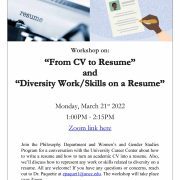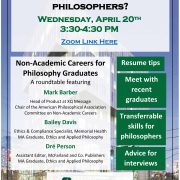Information on Non-Academic Careers for Philosophers
On this page you’ll find a number of resources designed to support our students’ pursuits within non-academic careers. As these resources reflect, we consider academia only one option among many for a fulfilling career trajectory, and we are here to support and encourage students in whatever professional and personal directions they pursue after our program. To talk more about non-academic career opportunities, please feel free to reach out to our undergraduate program director, Dr. Mark Sanders, our graduate program director, Dr. Andrea Pitts, or consider scheduling an appointment with the UNC Charlotte Career Center.
UNC Charlotte Recorded Events:
“From CV to Resume” and “Diversity Work/Skills on a Resume” Workshop

(Recording Access Passcode: ^?gM4D83)
External Links
What can I do with a Master’s Degree in Philosophy? Description of some potential non-academic career paths after the MA, and a list of professional skills to describe your training and expertise.
Launching a Non-Academic Career: Are you considering a non-academic career? In this section we outline the steps you can take to make this transition. It starts with creating your professional narrative, enhancing that narrative as you gain more experience, and then using that narrative to apply for non-academic positions.
Philosophers Beyond Academia Network: The Philosophers Beyond Academia Network is open to any person holding a degree in philosophy (bachelor’s, masters, or doctorate) whose primary profession is not as an academic, as well as those studying or working in philosophy who are interested in exploring non-academic opportunities. We welcome those with philosophy backgrounds who are working in alternative-academic careers, such as university administration or academic publishing, as well as those whose careers are in business, journalism, technology, the arts, nonprofits, government, and other sectors.
Beyond Academia: Professional Opportunities for Philosophers – Resource Guide: Beyond Academia is intended to provide guidance in the form of resources, information, and advice to philosophers who are interested in exploring a wide range of professions outside of academia. It includes links to resources for non-academic career opportunities; data on non-academic careers, including new academic placement data and analysis; and biographical essays of philosophers who have successfully found ways to use their philosophical training outside of academia. It also provides recommendations for on maintaining connections with philosophers working outside academia and preparing philosophy students for non-academic students. We encourage department chairs and placement officers to share this resource with their students.
Wine and Government Cheese Newsletter: W&GC is a newsletter that lists positions that are 1) open to the public and, 2) applicable to people with MAs or PhDs in the humanities and the humanistic social sciences. Subscribing gets you a weekly e-mail with highlights from the job descriptions and links to the questionnaires so you can do a better job searching and applying for jobs.
Philosophers in Industry: An Informal Directory: This directory is intended to help academic philosophers network outside of academia, given persistent shortages in academic jobs particularly in the COVID-19 era.
Phil Skills: This website collects interviews of non-academic (meaning non-faculty) philosophers by non-academic philosophers.
Inside Higher Ed Alt-Ac Careers: List of all stories published by Inside Higher Ed relating to alternative professional opportunities within universities besides the traditional faculty position, including guidance on why and how to pursue these opportunities.
Free Range Philosophers: Free Range Philosophers presents interviews of people with advanced training in philosophy who are either working outside of traditional academic jobs or engaged in philosophical outreach or other philosophical activities outside of the academic classroom. Interviews are conducted via e-mail and edited for web presentation. In addition to serving as a resource for graduate students and PhDs who are exploring other career options, the hope is that these interviews will help philosophers inside and outside the academy expand our conception of what philosophy is and what it can be.
The Philosopher’s Cacoon Alt-Ac Workshop: where guest-contributors with higher degrees in philosophy provide concrete tips on how to transition effectively from academic philosophy to careers outside of the academy.
Doing Things with Philosophy – Beyond Academia: A blog by Helen De Cruz that offers profiles of people with philosophy degrees at work outside academia
LinkedIn Group for Professional Philosophers in Industry: A LinkedIn group for philosophers who have left academic philosophy. “The purpose of this group is to provide professional philosophers who work (or seek to work) outside of traditional academic settings an opportunity to network, share information and opportunities, and generally pursue their professional development. Membership requires at least a master’s degree in philosophy.”
Public Philosophy Network: The Public Philosophy Network promotes philosophy that engages issues of public concern and works collaboratively with civic and professional communities. Our mission is to support philosophers who use their concepts and skills to serve communities outside of academia and to make positive changes in society; to reflect on how philosophy is transformed by various types of public engagement; and to support institutional changes supportive of publicly engaged work.
PLATO – Philosophy Learning and Teaching Organization: PLATO is devoted to enriching young people’s educational experiences by introducing them to the benefits and rigors of philosophy before they graduate from high school. Our members include professional philosophers and other educators, K-12 teachers, graduate and undergraduate students, and school administrators.
Information About Teaching and Practicing Philosophy Outside the Academy (from Free Range Philosophers)
- There is now an international movement to expand philosophy into primary and secondary school classrooms. For just a few examples see The P4C Co-operative, the University of Washington’s Center for Philosophy for Children, and the website Teaching Children Philosophy. For general background on the movement to teach philosophy to children, see the Stanford Encyclopedia of Philosophy’s entry on Philosophy for Children.
- Prisons are another non-traditional academic space for teaching philosophy. Daily Nous interviewed a handful of U.S.-based philosophers on their motivations for and experience with teaching philosophy in prisons. The Guardian has an entire series on philosophy in prisons. And, more recently, Columbia University’s Christina Mercer discussed her experience teaching philosophy in prison with the Washington Post.
- Faculty and students from Sanford University provide philosophy education to the residents of a women’s drug and alcohol recovery center through the Hope House Scholars program.
- A number of philosophers teach free college-level classes through a program called the Clemente Course in the Humanities whose mission is to make the benefits of humanities education available “to people who have been deprived of these riches through economic, social, or political forces.”
- Brooklyn Public Philosophers presents a philosophy speaker series for the general public and hosts an Ask a Philosopher booth at a local farmer’s market.
